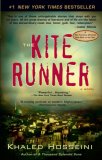Summary | Excerpt | Reading Guide | Reviews | Readalikes | Genres & Themes | Author Bio

Everyone agreed that my father, my Baba, had built the most beautiful house in the Wazir Akbar Khan district, a new and affluent neighborhood in the northern part of Kabul. Some thought it was the prettiest house in all of Kabul. A broad entryway flanked by rosebushes led to the sprawling house of marble floors and wide windows. Intricate mosaic tiles, handpicked by Baba in Isfahan, covered the floors of the four bathrooms. Gold-stitched tapestries, which Baba had bought in Calcutta, lined the walls; a crystal chandelier hung from the vaulted ceiling.
Upstairs was my bedroom, Baba’s room, and his study, also known as "the smoking room," which perpetually smelled of tobacco and cinnamon. Baba and his friends reclined on black leather chairs there after Ali had served dinner. They stuffed their pipes—except Baba always called it "fattening the pipe"—and discussed their favorite three topics: politics, business, soccer. Sometimes I asked Baba if I could sit with them, but Baba would stand in the doorway. "Go on, now," he’d say. "This is grown-ups’ time. Why don’t you go read one of those books of yours?" He’d close the door, leave me to wonder why it was always grown-ups’ time with him. I’d sit by the door, knees drawn to my chest. Sometimes I sat there for an hour, sometimes two, listening to their laughter, their chatter.
The living room downstairs had a curved wall with custom-built cabinets. Inside sat framed family pictures: an old, grainy photo of my grandfather and King Nadir Shah taken in 1931, two years before the king’s assassination; they are standing over a dead deer, dressed in knee-high boots, rifles slung over their shoulders. There was a picture of my parents’ wedding night, Baba dashing in his black suit and my mother a smiling young princess in white. Here was Baba and his best friend and business partner, Rahim Khan, standing outside our house, neither one smiling—I am a baby in that photograph and Baba is holding me, looking tired and grim. I’m in his arms, but it’s Rahim Khan’s pinky my fingers are curled around.
The curved wall led into the dining room, at the center of which was a mahogany table that could easily sit thirty guests—and, given my father’s taste for extravagant parties, it did just that almost every week. On the other end of the dining room was a tall marble fireplace, always lit by the orange glow of a fire in the wintertime.
A large sliding glass door opened into a semicircular terrace that overlooked two acres of backyard and rows of cherry trees. Baba and Ali had planted a small vegetable garden along the eastern wall: tomatoes, mint, peppers, and a row of corn that never really took. Hassan and I used to call it "the Wall of Ailing Corn."
On the south end of the garden, in the shadows of a loquat tree, was the servants’ home, a modest little mud hut where Hassan lived with his father.
It was there, in that little shack, that Hassan was born in the winter of 1964, just one year after my mother died giving birth to me.
In the eighteen years that I lived in that house, I stepped into Hassan and Ali’s quarters only a handful of times. When the sun dropped low behind the hills and we were done playing for the day, Hassan and I parted ways. I went past the rosebushes to Baba’s mansion, Hassan to the mud shack where he had been born, where he’d lived his entire life. I remember it was spare, clean, dimly lit by a pair of kerosene lamps. There were two mattresses on opposite sides of the room, a worn Herati rug with frayed edges in between, a three-legged stool, and a wooden table in the corner where Hassan did his drawings. The walls stood bare, save for a single tapestry with sewn-in beads forming the words Allah-u-akbar. Baba had bought it for Ali on one of his trips to Mashad.
It was in that small shack that Hassan’s mother, Sanaubar, gave birth to him one cold winter day in 1964. While my mother hemorrhaged to death during childbirth, Hassan lost his less than a week after he was born. Lost her to a fate most Afghans considered far worse than death: She ran off with a clan of traveling singers and dancers.
From The Kite Runner by Khaled Hosseini, copyright © 2003 Khaled Hosseini, published by G. P. Putnam's Sons, a member of Penguin Group (USA) Inc., all rights reserved, reprinted with permission from the publisher.
There are two kinds of people in the world: those who divide the world into two kinds of people, and those who don'...
Click Here to find out who said this, as well as discovering other famous literary quotes!
Your guide toexceptional books
BookBrowse seeks out and recommends the best in contemporary fiction and nonfiction—books that not only engage and entertain but also deepen our understanding of ourselves and the world around us.